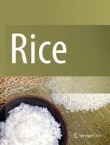Aims and scope
Rice aims to fill a glaring void in basic and applied plant science journal publishing. This journal is the world's only high-quality serial publication for reporting current advances in rice genetics, structural and functional genomics, comparative genomics, molecular biology and physiology, molecular breeding and comparative biology. Rice welcomes review articles and original papers in all of the aforementioned areas and serves as the primary source of newly published information for researchers and students in rice and related research.
Benefits of publishing with SpringerOpen
High visibility
Rice's open access policy allows maximum visibility of articles published in the journal as they are available to a wide, global audience.
Speed of publication
Rice offers a fast publication schedule whilst maintaining rigorous peer review; all articles must be submitted online, and peer review is managed fully electronically (articles are distributed in PDF form, which is automatically generated from the submitted files). Articles will be published with their final citation after acceptance, in both fully browsable web form, and as a formatted PDF; the article will then be available through Rice and SpringerOpen.
Flexibility
Online publication in Rice gives you the opportunity to publish large datasets, large numbers of color illustrations and moving pictures, to display data in a form that can be read directly by other software packages so as to allow readers to manipulate the data for themselves, and to create all relevant links (for example, to PubMed, to sequence and other databases, and to other articles).
Promotion and press coverage
Articles published in Rice are included in article alerts and regular email updates.
In addition, articles published in Rice may be promoted by press releases to the general or scientific press. These activities increase the exposure and number of accesses for articles published in Rice.
Copyright
Authors of articles published in Rice retain the copyright of their articles and are free to reproduce and disseminate their work (for further details, see the copyright and license agreement).
For further information about the advantages of publishing in a journal from SpringerOpen, please click here.
Open access
All articles published by the Rice are made freely and permanently accessible online immediately upon publication, without subscription charges or registration barriers. Further information about open access can be found here.
As authors of articles published in the Rice you are the copyright holders of your article and have granted to any third party, in advance and in perpetuity, the right to use, reproduce or disseminate your article, according to the SpringerOpen copyright and license agreement.
For those of you who are US government employees or are prevented from being copyright holders for similar reasons, SpringerOpen can accommodate non-standard copyright lines. Please contact us if further information is needed.
Article processing charges (APC)
Authors who publish open access in Rice are required to pay an article processing charge (APC). The APC price will be determined from the date on which the article is accepted for publication.
The current APC, subject to VAT or local taxes where applicable, is: £2090.00/$2990.00/€2490.00
Visit our open access support portal and our Journal Pricing FAQs for further information.
Open access funding
Visit Springer Nature’s open access funding & support services for information about research funders and institutions that provide funding for APCs.
Springer Nature offers agreements that enable institutions to cover open access publishing costs. Learn more about our open access agreements to check your eligibility and discover whether this journal is included.
Springer Nature offers APC waivers and discounts for articles published in our fully open access journals whose corresponding authors are based in the world’s lowest income countries (see our APC waivers and discounts policy for further information). Requests for APC waivers and discounts from other authors will be considered on a case-by-case basis, and may be granted in cases of financial need (see our open access policies for journals for more information). All applications for discretionary APC waivers and discounts should be made at the point of manuscript submission; requests made during the review process or after acceptance are unable to be considered.
Indexing services
All articles published in Rice are included in:
- Academic OneFile
- Biology & Environmental Sciences
- CABS
- Current contents
- EBSCO
- Expanded Academic
- Food Science and Technology Abstracts
- Journal Citation Reports/Science Edition
- OCLC
- PubMed
- PubMed Central
- Science Citation Index Expanded
- SCImago
- Scopus
- Summon by Serial Solutions
The full text of all articles is deposited in digital archives around the world to guarantee long-term digital preservation. You can also access all articles published by SpringerOpen on SpringerLink.
Editorial policies
All manuscripts submitted to Rice should adhere to SpringerOpen's editorial policies.
Once your article is accepted, it will be processed by production and published shortly afterwards. In some cases, articles may be held for a short period of time prior to publication. If you have any concerns or particular requirements please contact the Journal.
Springer Nature remains neutral with regard to jurisdictional claims in published maps and institutional affiliations.
Citing articles in Rice
Articles in Rice should be cited in the same way as articles in a traditional journal. Because articles are not printed, they do not have page numbers; instead, they are given a unique article number.
Article citations follow this format:
Authors: Title. Rice [year], [volume number]:[article number].
e.g. Roberts LD, Hassall DG, Winegar DA, Haselden JN, Nicholls AW, Griffin JL: Increased hepatic oxidative metabolism distinguishes the action of Peroxisome Proliferator-Activated Receptor delta from Peroxisome Proliferator-Activated Receptor gamma in the Ob/Ob mouse. Rice 2009, 1:115.
refers to article 115 from Volume 1 of the journal.
Appeals and complaints
Authors who wish to appeal a rejection or make a complaint should follow the procedure outlined in the BMC Editorial Policies.
